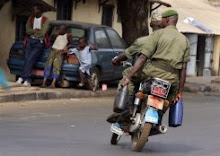When I arrived in Liberia in 2004, the country's army was, at best, a mess. After decades of civil war, soldiers' hands were as bloodied as any rebels'. The troops were undisciplined, unpaid, and undertrained. They were a motley crew that protected no one in a country where pretty much everyone was vulnerable to violence. And it was our job to turn them into a professional military.
Today, just five years later, Liberia's soldiers are among the best in the region. They have been vetted, trained, paid, and readied for action. The difference was the impact of that little-known U.S. initiative -- the first of its kind -- that literally rebuilt the Liberian army from scratch. Our goal was for the Liberian army to fill the role of U.N. peacekeepers as the latter were slowly phased out, and it worked astonishingly well.
Now that model might be of use again. President Barack Obama's strategy for Afghanistan is predicated on creating Afghan security forces to replace coalition soldiers. The idea of training local troops to replace U.S. or international ones is not a new one; the United States famously tried to do it and failed in Vietnam. More recently, in 2005, then-President George W. Bush outlined his plan for Iraq and the aim that "as the Iraqis stand up, we will stand down." Yet the United States' ability to raise foreign forces has been paltry. This is because raising an army is difficult and dangerous: Do it too well and it might turn into a Praetorian Guard or a vehicle for a coup d'état. Do the job poorly and it could terrorize the citizens it is sworn to protect and much worse.
Today the stage is Afghanistan -- a near-failed state controlled by a weak central government, essentially devoid of basic infrastructure. The lessons of Liberia may help. Both countries are relatively underdeveloped and have a war-ravaged modern history. What's more, Afghans and Liberians both lack a sense of national identity as such and often identify first by ethnic group and second as Afghan or Liberian. These factors are challenges for creating a national army in a place where the majority of the population is illiterate, tribal or local loyalties trump patriotic allegiance, and ethnic blood feuds are ancient and deep.
Continue.By Sean McFate
Source: Foreign Policy (07/01/2010)

No comments:
Post a Comment